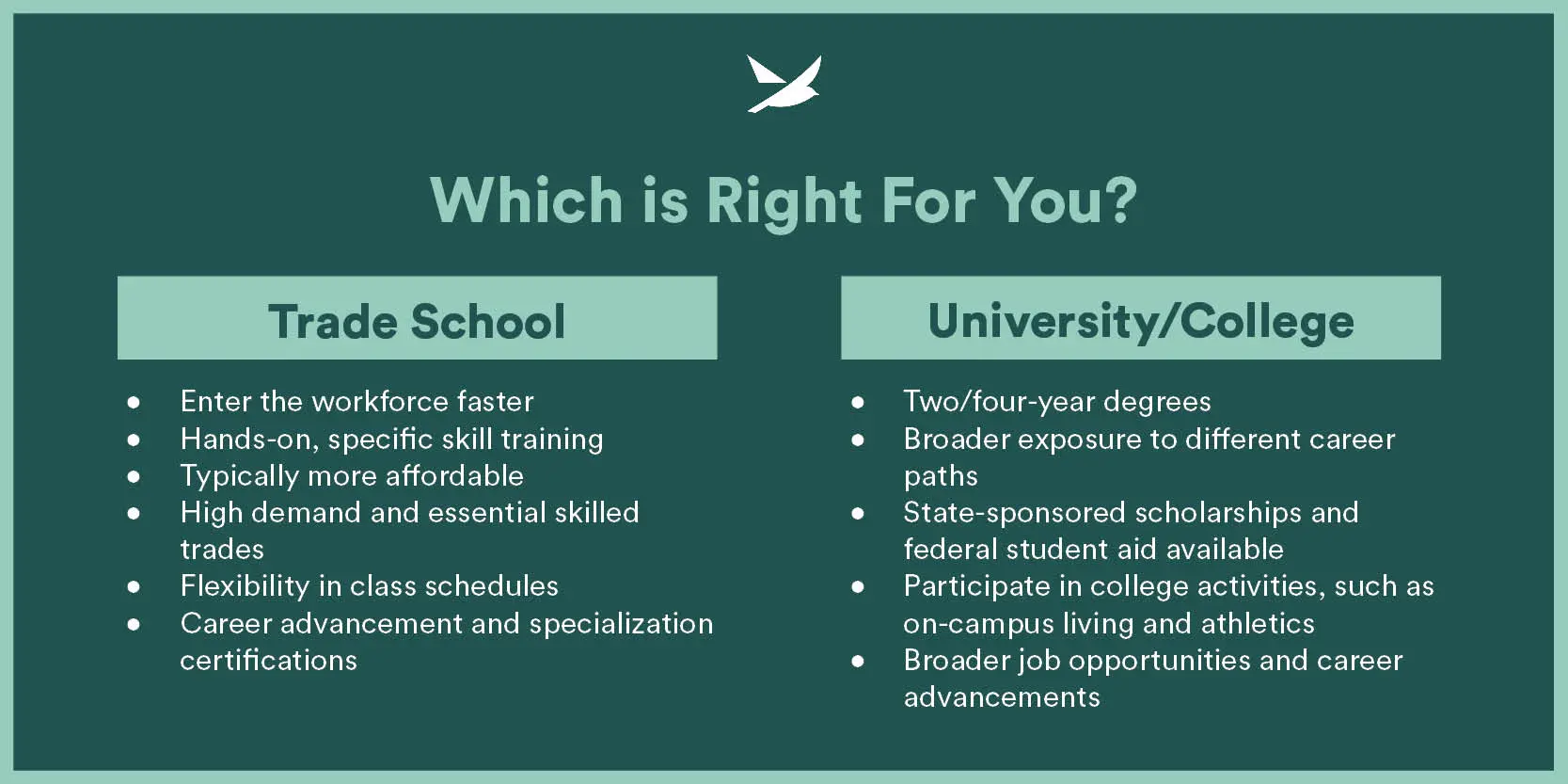

In This Post
Consider What Fields You're Interested In
What Do You Want to Learn?
Price Comparison and Earning Potential
Making the Decision
____________
As you approach the end of your high school career, there are a lot of big decisions to make. Do you want to start working right away? Perhaps you want to pursue a degree or a trade certification program – or maybe you don’t know what you want to do just yet.
That’s totally normal – you’ve got plenty of time to make those big decisions. To help you start planning for your future, we put together a quick breakdown of the differences between trade school and university.

Consider What Fields You’re Interested In
The type of career you’re interested in will be the biggest factor in your choice between trade school and university.
Fields like construction, welding, auto repair, or cosmetology don’t necessarily require a college degree, but they do require specific training. Trade school is a great option to develop those skills quickly and affordably in a structured environment.
Other career areas like teaching or engineering will generally require a minimum of a bachelor’s degree from an accredited college or university.
Think about the kind of work you want to do in the future – what kind of education does that field require?
What Do You Want to Learn?
You should also think about the kinds of things you would like to learn in your post-secondary education.
Trade school programs are typically focused on training you for a specific profession, or trade.
Take welding as an example. A trade school welding course will give you all the expertise you need to pursue a job as a welder. You probably won’t take many classes (if any) in other programs. You’re there to learn the trade of welding.
On the other hand, university/college tends to cover a broader range of topics. You will have a major, which is the focus of your degree, but most institutions require general education requirements and electives on top of that core program. So, for example, you might be studying marketing, but you would still be taking courses outside of that (such as English, math, etc.).
If you want to learn a specific skillset for a specific career, trade school may be your best bet. However, if you want to learn about a broader variety of subjects, college or university may be a better option.
Price Comparison and Earning Potential
Program prices depend on the school you attend.
Trade schools are less expensive (on average) than universities. Their programs are generally shorter than traditional four-year bachelor’s degrees and have lower tuition per semester.
Colleges and universities can vary widely in price from school to school. A small private university is going to cost significantly more than a state school or community college. If you’re interested in taking the university route, look into scholarship and grant opportunities to help make it more affordable.
South Carolina has scholarship opportunities for both trade schools and universities. Learn more at https://www.che.sc.gov/students-families-and-military/scholarships-and-grants-sc-residents
When thinking about the cost of attendance, you should also consider the earning potential you will have once you start working.
Many sources state that university graduates have higher earning potential on average, but that depends on your field. If you get your degree in business, for example, you may make more in your lifetime than if you pursued cosmetology. On the other hand, if you attend trade school and become a welder, you may make more money over time than someone who becomes a teacher. It truly depends on the specific field you choose and the path your individual career takes.
Making the Decision
Making the choice between trade school and university can feel overwhelming.
If you’re having a hard time deciding, reach out to your high school guidance counselor. They help students just like you every year, and their wisdom can lead you in the right direction.
Your parents are another great resource. Sit down with them to discuss your financial situation. How much money (if any) are they planning to provide for your education? Do they have any educational savings set aside for you? Knowing where you stand financially can help you make a more informed choice about your higher education.
Ultimately, the choice is yours. You have to trust your gut and go with the option that works for you, not anyone else.
No matter what path you take, we know that you are going to do great things – Team Spero believes in you! So much so, that no matter what you choose (college, university, or trade school), as a Spero member pursuing higher-education, you may be eligible to apply for our $5,000 scholarship. Get all the details at https://spero.financial/higher-education-scholarship/
This material is for educational purposes only and is not intended to provide specific advice or recommendations for any individual.



